Bingyang Cheng
HPTune: Hierarchical Proactive Tuning for Collision-Free Model Predictive Control
Jan 29, 2026Abstract:Parameter tuning is a powerful approach to enhance adaptability in model predictive control (MPC) motion planners. However, existing methods typically operate in a myopic fashion that only evaluates executed actions, leading to inefficient parameter updates due to the sparsity of failure events (e.g., obstacle nearness or collision). To cope with this issue, we propose to extend evaluation from executed to non-executed actions, yielding a hierarchical proactive tuning (HPTune) framework that combines both a fast-level tuning and a slow-level tuning. The fast one adopts risk indicators of predictive closing speed and predictive proximity distance, and the slow one leverages an extended evaluation loss for closed-loop backpropagation. Additionally, we integrate HPTune with the Doppler LiDAR that provides obstacle velocities apart from position-only measurements for enhanced motion predictions, thus facilitating the implementation of HPTune. Extensive experiments on high-fidelity simulator demonstrate that HPTune achieves efficient MPC tuning and outperforms various baseline schemes in complex environments. It is found that HPTune enables situation-tailored motion planning by formulating a safe, agile collision avoidance strategy.
NTK-Guided Implicit Neural Teaching
Nov 19, 2025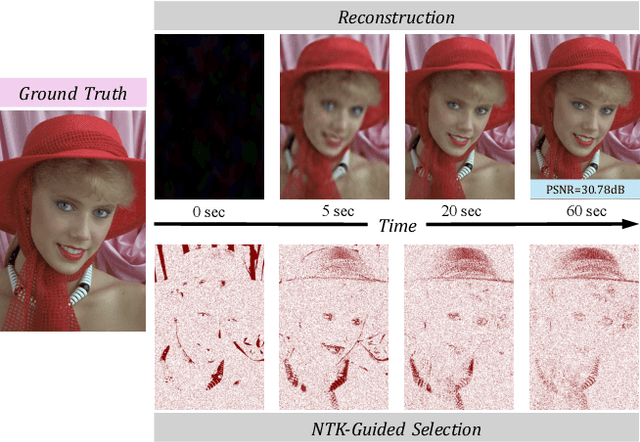
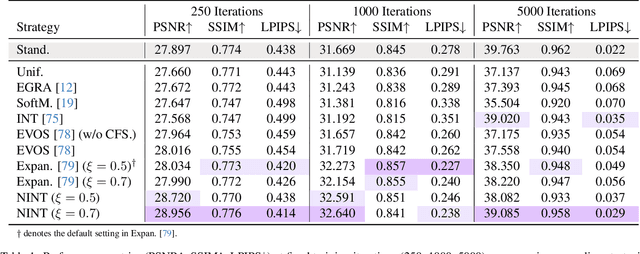
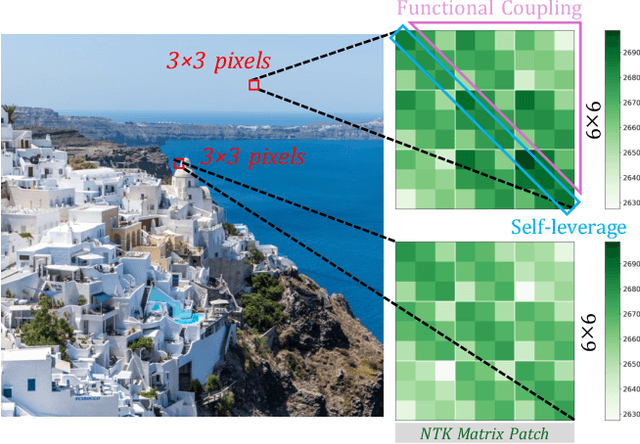

Abstract:Implicit Neural Representations (INRs) parameterize continuous signals via multilayer perceptrons (MLPs), enabling compact, resolution-independent modeling for tasks like image, audio, and 3D reconstruction. However, fitting high-resolution signals demands optimizing over millions of coordinates, incurring prohibitive computational costs. To address it, we propose NTK-Guided Implicit Neural Teaching (NINT), which accelerates training by dynamically selecting coordinates that maximize global functional updates. Leveraging the Neural Tangent Kernel (NTK), NINT scores examples by the norm of their NTK-augmented loss gradients, capturing both fitting errors and heterogeneous leverage (self-influence and cross-coordinate coupling). This dual consideration enables faster convergence compared to existing methods. Through extensive experiments, we demonstrate that NINT significantly reduces training time by nearly half while maintaining or improving representation quality, establishing state-of-the-art acceleration among recent sampling-based strategies.
Large-Scale Bayesian Tensor Reconstruction: An Approximate Message Passing Solution
May 22, 2025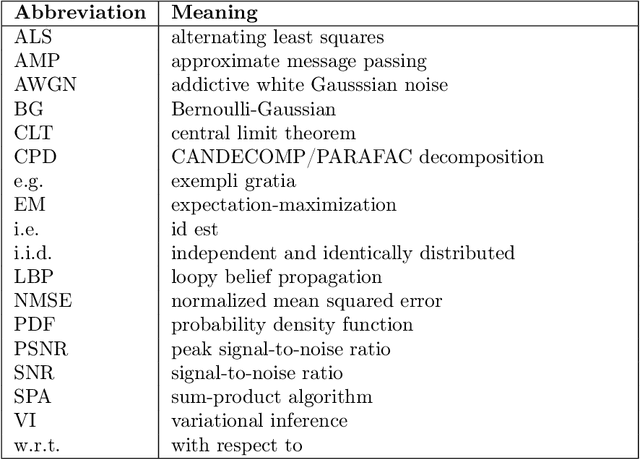
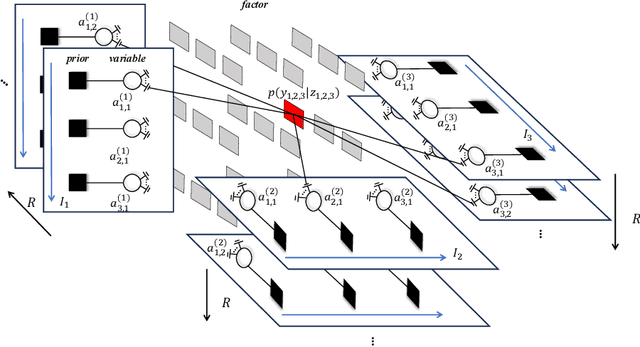
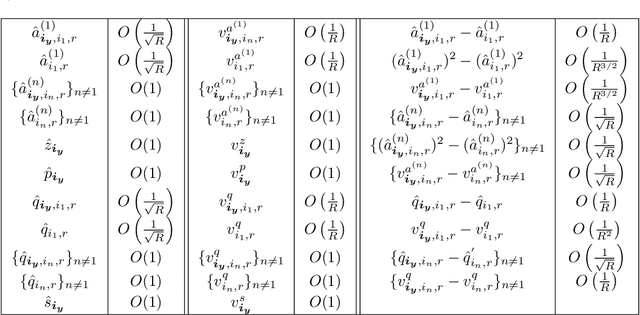
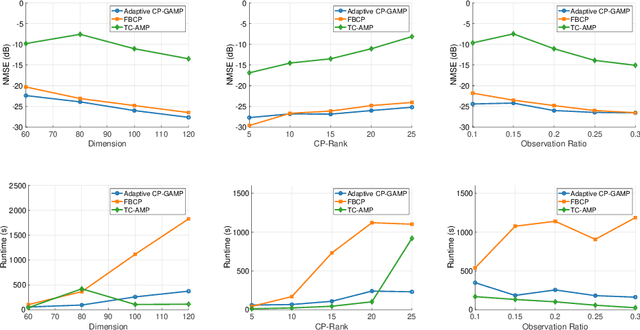
Abstract:Tensor CANDECOMP/PARAFAC decomposition (CPD) is a fundamental model for tensor reconstruction. Although the Bayesian framework allows for principled uncertainty quantification and automatic hyperparameter learning, existing methods do not scale well for large tensors because of high-dimensional matrix inversions. To this end, we introduce CP-GAMP, a scalable Bayesian CPD algorithm. This algorithm leverages generalized approximate message passing (GAMP) to avoid matrix inversions and incorporates an expectation-maximization routine to jointly infer the tensor rank and noise power. Through multiple experiments, for synthetic 100x100x100 rank 20 tensors with only 20% elements observed, the proposed algorithm reduces runtime by 82.7% compared to the state-of-the-art variational Bayesian CPD method, while maintaining comparable reconstruction accuracy.
FedEMA: Federated Exponential Moving Averaging with Negative Entropy Regularizer in Autonomous Driving
May 01, 2025Abstract:Street Scene Semantic Understanding (denoted as S3U) is a crucial but complex task for autonomous driving (AD) vehicles. Their inference models typically face poor generalization due to domain-shift. Federated Learning (FL) has emerged as a promising paradigm for enhancing the generalization of AD models through privacy-preserving distributed learning. However, these FL AD models face significant temporal catastrophic forgetting when deployed in dynamically evolving environments, where continuous adaptation causes abrupt erosion of historical knowledge. This paper proposes Federated Exponential Moving Average (FedEMA), a novel framework that addresses this challenge through two integral innovations: (I) Server-side model's historical fitting capability preservation via fusing current FL round's aggregation model and a proposed previous FL round's exponential moving average (EMA) model; (II) Vehicle-side negative entropy regularization to prevent FL models' possible overfitting to EMA-introduced temporal patterns. Above two strategies empower FedEMA a dual-objective optimization that balances model generalization and adaptability. In addition, we conduct theoretical convergence analysis for the proposed FedEMA. Extensive experiments both on Cityscapes dataset and Camvid dataset demonstrate FedEMA's superiority over existing approaches, showing 7.12% higher mean Intersection-over-Union (mIoU).
Channel Estimation for Rydberg Atomic Receivers
Mar 12, 2025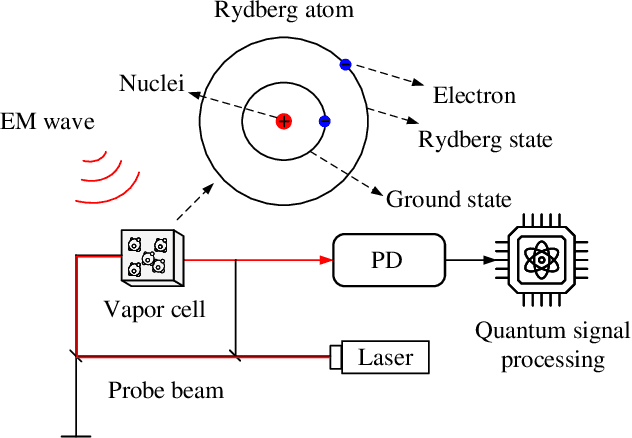
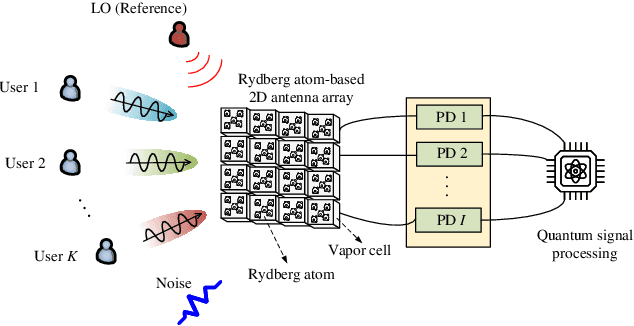
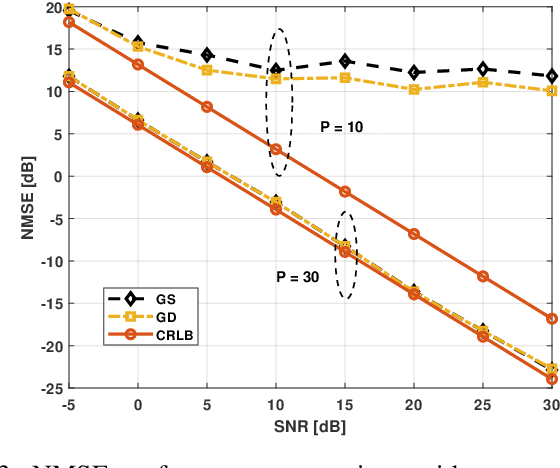
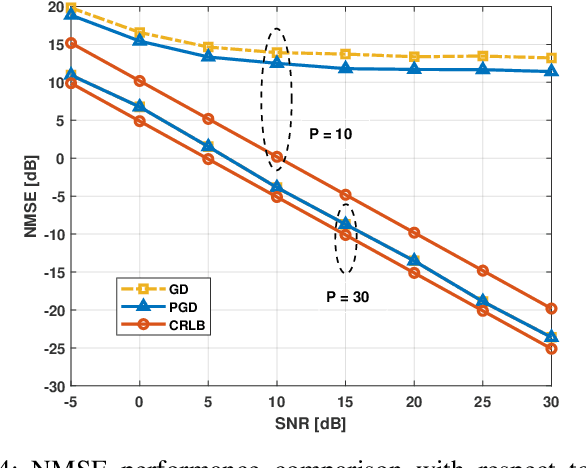
Abstract:The rapid development of the quantum technology presents huge opportunities for 6G communications. Leveraging the quantum properties of highly excited Rydberg atoms, Rydberg atom-based antennas present distinct advantages, such as high sensitivity, broad frequency range, and compact size, over traditional antennas. To realize efficient precoding, accurate channel state information is essential. However, due to the distinct characteristics of atomic receivers, traditional channel estimation algorithms developed for conventional receivers are no longer applicable. To this end, we propose a novel channel estimation algorithm based on projection gradient descent (PGD), which is applicable to both one-dimensional (1D) and twodimensional (2D) arrays. Simulation results are provided to show the effectiveness of our proposed channel estimation method.
A General Optimization Framework for Tackling Distance Constraints in Movable Antenna-Aided Systems
Mar 04, 2025Abstract:The recently emerged movable antenna (MA) shows great promise in leveraging spatial degrees of freedom to enhance the performance of wireless systems. However, resource allocation in MA-aided systems faces challenges due to the nonconvex and coupled constraints on antenna positions. This paper systematically reveals the challenges posed by the minimum antenna separation distance constraints. Furthermore, we propose a penalty optimization framework for resource allocation under such new constraints for MA-aided systems. Specifically, the proposed framework separates the non-convex and coupled antenna distance constraints from the movable region constraints by introducing auxiliary variables. Subsequently, the resulting problem is efficiently solved by alternating optimization, where the optimization of the original variables resembles that in conventional resource allocation problem while the optimization with respect to the auxiliary variables is achieved in closedform solutions. To illustrate the effectiveness of the proposed framework, we present three case studies: capacity maximization, latency minimization, and regularized zero-forcing precoding. Simulation results demonstrate that the proposed optimization framework consistently outperforms state-of-the-art schemes.
 Add to Chrome
Add to Chrome Add to Firefox
Add to Firefox Add to Edge
Add to Edge